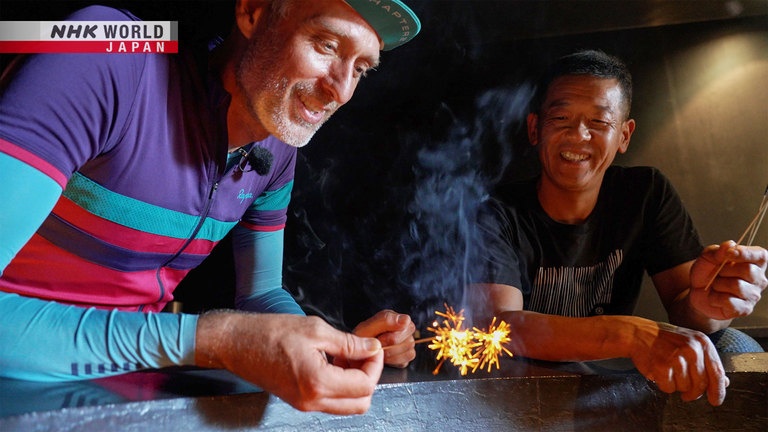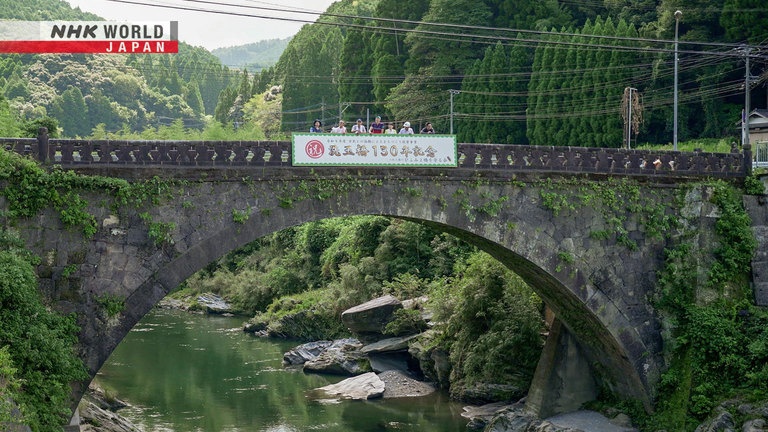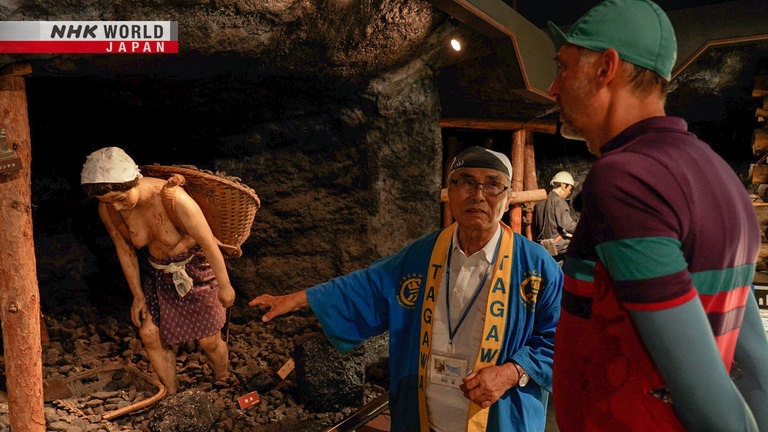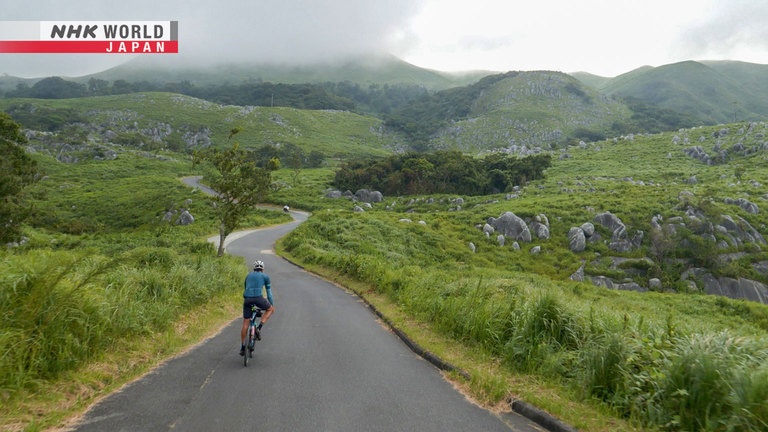Fukuoka - Always Thinking Ahead
Historically the nation's gateway to Asia, Fukuoka Prefecture is where Japan's rice-growing culture began. We meet a couple reviving their community through tourism and organic farming, a singing boatman in a city of canals and a maker of traditional fireworks. After helping villagers maintain a century-old stone bridge, we hear the history of coal in this area - once a major industry driving Japan's modernization - from the last of its miners, as he sings old songs of the harshness of life below ground.




Transcript
The best way to discover little-known sights and make even familiar places feel brand new,
is to go exploring by bicycle.
This time, we're exploring Fukuoka, since ancient times Japan's gateway to the rest of Asia.
Well-watered and fertile, this is a land ideal for farming, especially rice.
Ah, a beautiful valley!
The bounties of nature deeply affected culture here.
Such a simple firework, but fascinating to watch.
This is a landscape shaped by human activity.
This landscape was created by the work of my family,
so for me the land itself is family too.
Local songs tell of a raw, harsh history.
Tagawa miners died to make Japan wealthy.
We must never forget their contribution.
Wow. What a beautiful summer day.
Come with us now, on a 400-kilometer ride through Fukuoka.
It's a two-hour flight from Tokyo to Fukuoka.
Close by the airport lie the ancient Itazuke ruins, today drenched by incessant rain.
These dwellings are recreations showing how people lived here 2,500 years ago.
Looks like the rain is over.
Our cyclist, Michael Rice, is from Colorado in the USA.
A competitor in international triathlons, Michael's life revolves around cycling.
This place here, they say it's the place where rice farming started in Japan.
And that's amazing because rice farming is so integral to the Japanese culture.
And this is going to be my first time to really delve into the history of Fukuoka.
Okay! Rain stopped, time to go.
Our trip will take four days.
On the first day, Michael will ride along the Sea of Japan coast.
The second day takes him south along the Chikugo River to the Ariake Sea.
On the third day, he'll go north again to the coal mining region of Tagawa and the Hiraodai karst plateau.
And the final day ends at the city of Kitakyushu.
This really is a major city.
But you'll be amazed at how quickly we get out of the city along the coastline.
Unfortunately, the wet weather isn't letting up.
Fukuoka gets a lot of rain in summer, caused by moist winds off the sea.
I hope this is about the last of the rain.
Three hours riding has brought Michael to the Itoshima Peninsula.
Not far from Fukuoka City, it's known for its fine beaches and lush forests.
I love the view here. So beautiful.
Finally, the rain has stopped.
Look at these beautiful flowers.
The rain brings these flowers. Wonderful.
It's a lot cooler here with the rice fields.
A cool breeze blowing off them.
Itoshima has been a fertile farming area since ancient times,
and farmers today remain very conscious of this long history.
- Hello! It's a great view.
- Yes, it is. It's nice isn't it?
Ogushi Yukio runs a tourist farm here in Itoshima.
Ah, there's my wife!
Hello!
Ogushi's wife, Maeda Kazuko, shares in the running of the farm.
It covers an area of 12 hectares.
Visitors can pick many kinds of vegetables, varying with the season.
This eggplant really is long.
That's what the name naganasu means.
So many kinds.
- You can just eat this right off the plant.
- Really? I usually don't like green peppers.
But this is so sweet.
Why are these peppers so sweet?
There's no bitter aftertaste at all.
They're the real thing - organically grown.
In recent years, as farmers age and lack successors, much farmland in Itoshima has fallen into disuse.
Originally, Yukio was an architect, and Kazuko ran a restaurant.
Unable to stand by as the countryside turned into a wasteland, they took over this farm 13 years ago.
When we cut bamboo, we burn it to make chips
that we mix with soil and grass.
That way we can recycle it back into the earth.
After years of pesticide-free cultivation and revitalizing the soil,
they finally started getting the vegetables they wanted.
What did it feel like, your first harvest?
We were so happy,
we just stared at each other and cried.
I was saying something like "We did it!"
We were just grinning at each other.
People have farmed here for centuries.
We're standing right where they worked.
Once the farm was producing well, they added a cafe for visitors to enjoy freshly harvested vegetables.
Each year they invite local elementary school students to help with rice planting.
When the rice is ready to harvest,
a wind always starts to blow across the field.
The rice stalks shake in the breeze.
I think of it as a message from our ancestors,
the ones who first planted rice here.
- Thanking you for continuing their work?
- Exactly!
Michael gets to taste their rice, topped with umeboshi plums and a special homemade miso.
Thanks for all your help today!
Oh, the miso is delicious.
This rice is really good.
It's from the field we just came from.
I haven't eaten a rice ball in ages.
The rain has started again, so Michael decides cycling is over for the day.
Woohoo! The sun is out.
It's a beautiful morning.
The rest of the trip is going to be great.
Michael is now riding south, following the Chikugo River.
Wow, this is a big river. Really wide.
Definitely one of the wider rivers in Japan.
This river supplies water for irrigation, and is also a major source of drinking water.
I'm gonna go explore this town over here.
Yanagawa is a town of canals and waterways.
The city of canals. Canals all over the place.
I can see some tourists over there, taking a boat tour.
The first canals might have been dug here as irrigation ditches as much as 2,000 years ago.
As the town grew around a castle built in the 1500s,
new canals were built to allow boats to move around easily.
This is an interesting town.
Nishijima Hiroshi works as a boatman.
- Have you been doing this long?
- Oh, for about 50 years.
How long do you think the canals are?
In the town?
They seem to be everywhere. About 50km?
- Haha. Over 900. We have 930km of canals.
- Wow! Nearly 1,000km!
Nishijima sings a boatman's song of welcome for visitors.
"Green willows on misty banks.
So warm and pleasant."
"It's good to be on the river.
In Yanagawa in the summer."
That's great!
Wow, it's the ocean!
Made it back to the ocean. Yeah, it's low tide now.
This is the Ariake Sea, Japan's largest tidal flat, with endless mud shoals exposed at low tide.
Kyushu is so volcanic.
You can see on the other side of the ocean all those volcanic mountains.
It's so hot and humid.
The sweat's just dripping off me.
The temperature today is 34 degrees Celsius.
There's no place to get a drink.
Gotta look for a vending machine.
Ah, a vending machine. Got it.
Finally found a vending machine.
It's not just drinks, there's something else.
Is that fireworks?
It's a fireworks vending machine!
I came to buy drinks, but they sell fireworks. I'm going to check this out.
Hello!
- I see all these fireworks. Do you make them here?
- We do.
I noticed fireworks in that vending machine.
That's so customers can still buy them
even when we're closed.
Tsutsui Ryota is the third generation of a family that has been making fireworks for almost 100 years.
They have a shop next to the factory.
These are so cool.
Tsutsui's fireworks are all handmade in the old way.
As well as the traditional kinds, he has many innovative designs, perfect for gifts and souvenirs.
Subote are a kind of handheld firework.
This one is called Subote Botan.
I've never seen these before.
We've had them here for about 350 years.
This traditional local firework consists of a length of rice straw tipped with gunpowder.
Is it OK to go in?
Light the end and hold it
pointing slightly up for the best effect.
It's better in a breeze, to raise the temperature.
Watch what happens when I blow.
You get different effects depending
on the weather and the strength of the wind.
It's my first time to do this type.
So at first, it's like a big fire.
Oh okay, it's gonna be over.
And it's not over yet, you can blow on it.
Wow. It's really pretty.
It's fun! Really fun!
Today, Tsutsui is the only maker of Subote Botan fireworks.
This is it.
I'd never expect fireworks to be made from this.
I strip the outside off to leave just the core.
- The strongest part.
- Right.
- Isn't there a machine to do this?
- No, we have to do it all by hand.
Why use such a difficult method?
It's not so hard, really.
Everyone knows these fireworks,
and we don't want to let them die out.
I think the effort is worth it.
There used to be six fireworks companies in this area,
but competition from inexpensive imported fireworks drove the others out of business.
Tsutsui alone continued to pursue quality and new designs, using locally produced raw materials.
This is my field where I grow the rice I need.
When farmers began recycling rice straw to fertilize their fields, Tsutsui could no longer get the materials he needed,
so five years ago he began growing his own rice.
As long as we keep farming rice, we should keep
making these traditional handheld fireworks.
It's a part of Japanese culture that
I'd like people around the world to know about.
These fireworks bring people closer together.
And as they burn to the end, we get even closer.
Each one seems completely different.
It's a unique feeling.
That was fun!
A taste of how rice growing has left a deep mark on Japan's culture.
Look at this! Beautiful tea fields.
The next day starts in Yame, an area with a 600-year history of tea growing.
Wow. What a nice river.
Oh look at the stone bridge.
Ah, this bridge looks old.
Oh, another stone bridge. Oh wow.
The Hoshino River features many of these stone-built bridges.
What a beautiful river.
Look, there's another bridge.
Another stone bridge. That's beautiful!
Wow, look! There is a stone bridge. Really amazing.
Looks like people are doing something here.
Let's see what's going on.
Hello! What are you doing here?
It's the 130th anniversary of this bridge.
We're about to clean it up and hang a banner.
Uchida Rie works at a local tourist center.
She's organized a team of people to trim the weeds growing on this old bridge.
Michael lends a hand.
Get the hook round it and pull up.
That's it!
The bridges across the Hoshino River used to be wooden, but frequent floods kept sweeping them away.
After many requests from local residents, the changeover to stone bridges began 130 years ago.
Quite a haul.
We got a lot of weeds off the bridge.
They're quite a treasure.
You won't see anywhere else in Japan
with so many stone bridges like ours.
It makes me very proud.
The bridges are the result of
so much hard work by our predecessors.
So it's our responsibility to look after them well.
That's what I feel about it.
- How old are you?
- 52.
No spring chicken.
I'll be 70 in a couple of years.
But my heart is still 50.
- Younger than me!
- Still going strong!
A quick break to drink Yame tea, the local specialty.
Cheers!
That's so tasty. Really revives you.
- Such umami in the leaves.
- Strong, isn't it.
With this, who needs beer?
In 2012, these bridges were in danger of being removed.
Torrential rains had caused the river to rise.
And driftwood caught on the bridges was blamed for a local flood.
Uchida formed a group to save the bridges that grew to nearly 100 members.
When something that's always been there
might disappear, you look at it with new eyes.
The thought we might lose
it made us realize its importance.
They repaired the bridges in cooperation with the local authorities,
implementing various measures to mitigate any future flood damage.
What does this bridge mean to you?
It's a treasure. A real treasure.
Beautiful!
Nicely done.
Good job, everyone!
Thank you! You were a great help.
Come back soon!
A community bound together by a common purpose.
Oh, look at those! There are watermills there.
Michael has now arrived at Tagawa.
Look at those, what are those, big chimneys?
Two big chimneys there. They look old.
Oh, there they are! Those are big.
Oh, look at those.
Hello. Are you a local guide?
That's right.
Harada Iwao works as a guide for a museum explaining the chimney's history.
The chimneys were part of the steam
machinery of this coal mine.
The elevator for miners
and coal was powered by steam.
- That's amazing.
- They are 45 meters high.
- What's that in your hand.
- Coal.
- It's lighter than I thought.
- Yes, it's light.
It's all coal underground here.
Dig anywhere and you get coal.
Starting in the 1890s, large-scale coal mining here in the Chikuho region
was a significant contributor to Japan's modernization.
Born and raised in Tagawa, Harada went straight from high school into the coal mines.
However, Japan had begun transitioning from coal to oil for its energy needs.
Seeing no future in it, Harada left the mines after just one year.
The coal mining era ended in my youth.
I'm probably the last Tagawa miner still alive.
This mine was turned into a museum to tell the history of the area.
For visitors, Harada will often sing the old songs of the coal miners.
"The moon came out."
"Over the Mitsui Coal Mine."
"The chimneys are so high."
"Their smoke reaches the moon."
Why did miners create such a happy song?
It's a job where you put your life on the line.
You never know if you'll get home that day.
In such harsh conditions, people make songs to
cheer themselves up, to keep going.
I think that's why this song sounds cheerful.
This is how they used to work, lying down.
Why no clothes?
It was too hot down there.
Also, it would be really hard to wash your clothes.
- They'd be black!
- And water wasn't so easily available then.
Coal mining was a dangerous, life-threatening job.
Women worked underground too, carrying coal through the tunnels.
My grandmother did this kind of work.
She died in a cave-in,
when my father was just 7 months old.
There's a song that goes like this.
"On a lonely night in the rain."
"A father with an umbrella cradles his baby."
"Don't cry, my little boy."
"Nothing can bring your dead mother back."
It's an old song,
but it feels as if it's about my grandmother.
Harada's father Kuniji became a miner despite his mother dying down there when he was a baby.
He worked in the mines all his life.
When Harada decided to leave the coal mines, his father didn't object.
He said I was doing the right thing by getting
completely away from the mining life.
He had seen friends die down there
and knew all the hardships of working in the mines.
I think he really didn't want his son to spend
his life doing the same as he did.
Now over 80, Harada continues to keep the memories of the old miners alive.
Many died in Tagawa coal mines so that
our country could grow and prosper.
I want to make sure people don't forget them.
It's the last day of the trip, and Michael is heading towards Kitakyushu, in the north of Fukuoka.
This is a long climb.
The view has gotta be worth it.
Come on views.
Give me some energy for the rest of this climb.
After fifty minutes of solid climbing, the scenery begins to open up.
Almost up to the views.
Oh, look at these views.
Oh, beautiful.
Forest into the rocks.
Ah, look at all these rocks.
I wonder who put all these rocks here?
Hiraodai is a limestone plateau.
These rocks, formed on the sea floor 350 million years ago,
have been eroded over millennia into a mysterious landscape.
Waiting for Michael are two Hiraodai nature guides.
Hello. I'm Michael.
Hi, we're the Nishinakas.
Have you always lived here?
My family have been here
since my grandfather's time.
I came here when we married,
5 years ago.
Akane and Koji guide visitors on treks over the karst plateau.
Another strange shape.
Looks like someone stacked these rocks up.
This is interesting.
This didn't start off as rock.
It was all originally sea creatures.
Sea creatures?
It's supposed to have happened
about 350 million years ago.
Corals and other calcium-shelled creatures
died and accumulated on the sea bed.
Eventually all this calcium turned to stone.
This rock we're looking at originated
millions of years ago, and now it's on the surface.
- The history of the earth, right there.
- It really is a miracle.
Oh, look over here.
- This is higotai, a summer flower.
- It's lovely.
There are no trees on Hiraodai, but over 900 kinds of flowers and grasses grow wild here throughout the year.
Each spring, we burn off the vegetation.
The grasses that died off in winter catch fire easily,
and then we let everything else burn.
This kind of landscape doesn't endure in nature.
Forests always take over.
It's often called natural scenery,
but it's really a collaboration between man and nature.
In Hiraodai, people have been doing these controlled burns for hundreds of years
to eradicate pests and maintain the grasslands.
Many outsiders settled here after World War II, and they continued the custom of annual burns.
They used the grass as fodder for livestock, and to make fertilizer for the fields they cultivated.
It was the basis of their livelihoods.
Today, only about 40 people still live on Hiraodai.
These are the names of the post-war pioneers
who settled in Hiraodai.
There's a Nishinaka there.
That's my grandfather.
Akane lived in Fukuoka City until six years ago.
She had never heard about the Hiraodai settlers before she met Koji and he told her about his family.
For the last two years, Akane and Koji have been interviewing residents to make a record of the area's history.
Those are probably tomatoes and potatoes.
It's a really nice place to live.
Don't you think so?
I hope they keep doing this.
We need a record of our history.
We all feel strongly about preserving Hiraodai.
So we're very grateful to these two for their
efforts to record our history before it's too late.
Each year, the population dwindles and the remaining residents get older,
so the work of collecting memories is more urgent than ever.
In a way, acting as nature guides
to a unique landscape makes us pioneers too.
Our grandparents and parents nurtured this landscape,
so I think of the land as my family.
Because it's family, we have to protect it.
Michael is now very close to his goal of Kitakyushu City.
This is so beautiful.
So nice coming down in the valley, with the ocean way off in the distance.
Really nice, a flying descent.
Okay, I'm gonna work up a sweat here, I can tell. Wow.
This is a wall.
Now, that's steep.
I've done like 50 episodes but this is the steepest, the steepest goal scene I've ever done.
Wah, even steeper.
Okay, there it is. So I walk from here.
The wind up here is really strong.
Made it to the end of Fukuoka.
We end the trip looking down on Kitakyushu.
This city was a major contributor to Japan's economic growth through its coal exports and heavy industry.
This time, what really struck me was the optimism of the people.
They're really optimistic about that they can just do it.
That they can just decide...
Okay, I'm going to protect these things, and make sure they're carried on for future generations.
And so whether it's the historic songs, or whether it's the beautiful scenery of the mountaintops or the rivers or the bridges,
or whatever it is they feel is beautiful and want to carry on for future generations.
And so that optimism of the people in Fukuoka is what really struck me,
and what I really take home in my heart from this trip.
Times change, lifestyles change, but the landscape remains an eternal presence.
And nothing will ever change the Fukuoka passion for life.